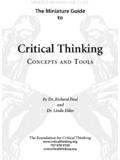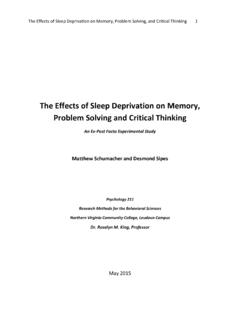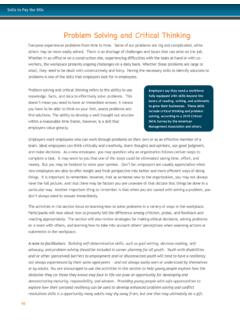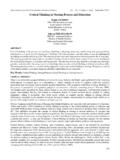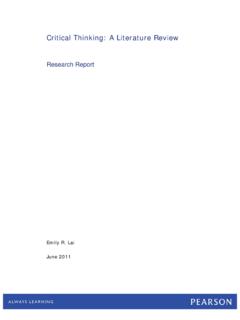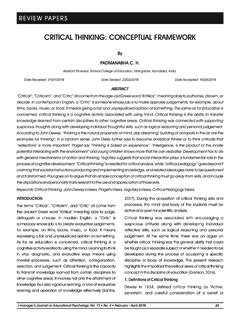Transcription of Critical Thinking: Cognitive vs. Metacognitive
1 Critical thinking : Cognitive vs. Metacognitive After you identify tools to assist students in identifying SMART daily learning targets, leading to SMART goals, which lead to a SMART destination beyond the GED ; you are ready to continue to fill their backpacks with strategies and tools that will assist them in arriving at one of their first destinations on their journey in adult education as they move towards higher education, training, work, or a career. We are going to provide students with strategies and tools they can transfer to higher education, training, the workplace, and home.
2 Strategies and tools that will assist will them to a) begin to think critically and strategically, b) work towards changing mindsets and overcome learned helplessness, and c) begin to take control and ownership over their learning. We can teach them not only what to learn, but also, how to learn. Cognitive and Metacognitive , Critical thinking strategies and tools are key tools that students may apply to succeed on the GED, in higher education, and in the workforce. Cognitive questions may be the Student Look-Fors discussed previously or they just may be questions that a student must ask and answer to reach the learning target (solve the problem or understand the text).
3 Metacognitive questions are questions that students must ask and answer to self-assess whether or not they are learning and then self-regulate or adjust how they are learning. What is the difference between the two? What to Learn Vs. How to Learn Cognitive Strategies Metacognitive Strategies Processes and strategies that help us to learn Processes and strategies to assess how we learn Mental processes and thinking abilities in which people engage on a daily basis such as memory, learning, problem solving , evaluation, reasoning, and decision making.
4 thinking about the thinking . Assesses the use of the Cognitive strategy and identifies how it was used and if it was used correctly and if not, how can it be used differently or what may be done differently when using it. Process of thinking Controls the Cognitive process. Levels of Cognition: Depth of Knowledge Planning, monitoring, evaluating, self-regulating Below are examples in reading, writing, social studies/science, and math. Level 1: Recall and Reproduction (identify, answer who, what, when, where, why, and how) What is the formula for ___?
5 Identify the details of ____? Who is ____? Describe the events of ___. List the ___. Level 2: Skill and Concept (Infer, categorize, compare and contrast, summarize, use context clues) How or why would use ___? What other way could you solve ___? What are examples and non-examples of___? What is the evidence for ___? If you changed these elements ___, what may happen? Level 3: Strategic thinking and Reasoning (Critique, develop an argument, solve a problem , draw conclusions based on data) What are the possible flaws in ____?
6 What is the theme or lesson learned? What inferences will these facts support? What evidence can you find to support ___? What ideas justify this position? Level 4: Extended thinking (Initiate, design, collaborate, research, synthesize) How may this argument be strengthened? What may be a different way to present this information? What may be some alternative solutions? What may be a different way to present this problem ? How may this be redesigned? Planning -What am I supposed to learn? What prior knowledge will help me with this task?
7 What should I do first? What should I look for in this reading? How much time do I have to complete this? In what direction do I want my thinking to take me? Monitoring - How am I doing? Am I on the right track? How should I proceed? What information is important to remember? Should I move in a different direction? Should I adjust the pace because of the difficulty? What can I do if I do not understand? Evaluating - How well did I do? What did I learn? Did I get the results I expected? What could I have done differently?
8 Is there anything I don t understand any gaps in my knowledge? Do I need to go back through the task to fill in any gaps in understanding? Self-regulating - Can I apply this way of thinking to other problems or situations? What may I do the same/different the next time? What to Learn How to Learn Reading Comprehension What is the author s key message? What is the evidence? How do I analyze the evidence? How do I use annotating? What is the key message to underline? How do I know what is evidence?
9 Planning: I need to be able to find the author s key message with evidence. Monitoring: Was I able to identify the key message with evidence? Did annotating work for me? Why or why not? Was I focused? Evaluating: What worked? What could I do differently? Writing What are the steps to organize my writing? How do I use this graphic organizer? How do I work with my peer in completing a graphic organizer? Planning: I need to be able to respond to an extended response prompt. Monitoring: Did I reach the goal?
10 Did I follow the correct steps in organizing? Using the graphic organizer? If not, what should I do instead? Evaluating: What worked? What can I do differently? Science/Social Studies What is the Declaration of Independence/Scientific Method? Why is this important to know? What are the steps in the SM? What do the terms mean? How do I identifying vocabulary I do not know? Planning: I need to know about the Declaration of Independence/Scientific Method. What do I already know about ___? Monitoring: Can I describe the steps?

